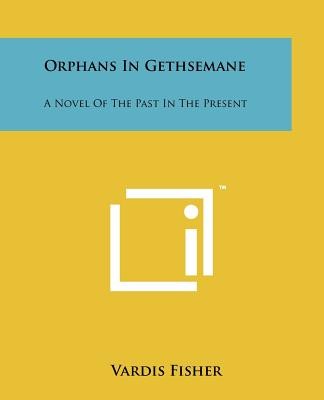
- We will send in 10–14 business days.
- Author: Vardis Fisher
- Publisher: Literary Licensing, LLC
- ISBN-10: 1258193302
- ISBN-13: 9781258193300
- Format: 19.1 x 23.5 x 4.9 cm, minkšti viršeliai
- Language: English
- SAVE -10% with code: EXTRA
Reviews
Description
In this great novel, Vardis Fisher completes his Testament of Man, the most gigantic imaginative project of our times.
When fisher completed his famous Vridar Hunter tetralogy of novels in the 1930's, he felt that he did not understand his protagonist completely. He felt that he, like Thomas Wolfe in writing of Eugene Gant, had not found the sources of human development and personality.
Then Fisher, a novelist of the greatest ability and integrity, determined to let the chips fall where they may and to take a long, careful look at those sources. Out of that look developed the twelve novels of the Testament of Man, each capturing an important insight into the ways man has developed since his earliest beginnings.
Orphans in Gethsemane is the climax of the long and serious look, for it concerns modern man as he is affected by the development Fisher discovered. Fittingly, the protagonist is again Vridar Hunter—and the Vridar Hunter story is here not only retold in revised form but also strengthened, deepened in understanding, and carried through to a great conclusion.
Filling this vast novel are the understandings which Vardis Fisher has attained in his view of modern man—his ideas of "childness" and of the adult. Without doubt, these understandings ae some of the most incisive and complete the reader has eve been offered, ideas which are bound to have a tremendous effect upon the consciousness of the reader.
EXTRA 10 % discount with code: EXTRA
The promotion ends in 22d.11:29:52
The discount code is valid when purchasing from 10 €. Discounts do not stack.
- Author: Vardis Fisher
- Publisher: Literary Licensing, LLC
- ISBN-10: 1258193302
- ISBN-13: 9781258193300
- Format: 19.1 x 23.5 x 4.9 cm, minkšti viršeliai
- Language: English English
In this great novel, Vardis Fisher completes his Testament of Man, the most gigantic imaginative project of our times.
When fisher completed his famous Vridar Hunter tetralogy of novels in the 1930's, he felt that he did not understand his protagonist completely. He felt that he, like Thomas Wolfe in writing of Eugene Gant, had not found the sources of human development and personality.
Then Fisher, a novelist of the greatest ability and integrity, determined to let the chips fall where they may and to take a long, careful look at those sources. Out of that look developed the twelve novels of the Testament of Man, each capturing an important insight into the ways man has developed since his earliest beginnings.
Orphans in Gethsemane is the climax of the long and serious look, for it concerns modern man as he is affected by the development Fisher discovered. Fittingly, the protagonist is again Vridar Hunter—and the Vridar Hunter story is here not only retold in revised form but also strengthened, deepened in understanding, and carried through to a great conclusion.
Filling this vast novel are the understandings which Vardis Fisher has attained in his view of modern man—his ideas of "childness" and of the adult. Without doubt, these understandings ae some of the most incisive and complete the reader has eve been offered, ideas which are bound to have a tremendous effect upon the consciousness of the reader.


Reviews